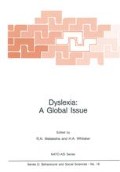Abstract
One of the tasks of experimental psychology is to attempt to discover what the procedures are by which we are able to read — that is, to develop theories which explain how we might proceed from print to meaning (in the case of silent reading for comprhension) or from print to speech (in the case of reading aloud). A variety of such theories has emerged over the past fifteen years. These theories have been concerned solely with the reading of single words, rather than with the reading of continous text; furthermore, they share a particular pretheoretical perspective in that reading is viewed as an information-processing activity. I mean by this that the various processes which go on during reading are characterised as involving the transformation of information from one form of representation to another. Reading for meaning is viewed as transforming an orthographic representation of a word into a semantic representation. Reading aloud is the transformation of orthography into phonology.
Access this chapter
Tax calculation will be finalised at checkout
Purchases are for personal use only
Preview
Unable to display preview. Download preview PDF.
References
Beauvois, M.-F., and Dérouesné, J. Phonological alexia: three dissociations. Journal of Neurology, Neurosurgery and Psychiatry, 1979, 42, 1115–1124.
Caramazza, A., and Martin, R. Short-term memory performance of phonological coding. Brain and Cognition, 1, (in press). 1982.
Coltheart, M. Lexical access in simple reading tasks. In Underwood, G. (Ed.), Strategies of Information Processing. London: Academic Press. 1978.
Coltheart, M. Deep dyslexia: a right hemisphere hypothesis. In Coltheart, M., Patterson, K. E., and Marshall, J. C. (Eds.), Deep Dyslexia. London: Routledge and Kegan Paul, 1980 a.
Coltheart, M. Visual information-processing. In Dodwell, P. C. (Ed.), New Horizons in Psychology. 2nd ed. London: Penguin Books. 1980 b.
Coltheart, M. Disorders of reading and their implications for models of normal reading. Visible Language, 1981, XV(2) 245–286.
Coltheart, M., Masterson, J., Byng, S., Prior, M., and Riddoch, J. Surface dyslexia. Quarterly Journal of Experimental Psychology, (in press). 1983.
Coltheart, M., Patterson, K. E., and Marshall, J. C. (Eds.) Deep Dyslexia. London: Routledge & Kegan Paul; 1980.
Dérouesné, J., and Beauvois, M.-F. Phonological processing in reading: data from alexia. Journal of Neurology, Neurosurgery and Psychiatry, 1979, 42, 1125–1132.
Funnell, E. Phonological processes in reading: new evidence from acquired dyslexia. British Journal of Psychology, (in press) 1983.
Glushko, R. J. The Organisation and activation of orthographic knowledge in reading aloud. Journal of Experimental Psychology (Human Perception and Performance), 1979, 5, 674–691.
Glushko, R. J. Principles for pronouncing print: the psyhcology of phonography. In Lesgold, A. M., and Perfetti, C. A. (Eds.), Interactive Processes in Reading. Hillsdale: Lawrence Erlbaum Associates, New Jersey, 1981.
Henderson, L. Orthography and Word Recognition in Reading. Academic Press, London. 1982.
Kay, J., and Marcel, A. J. One process, not two, in reading aloud: lexical analogies do the work of non-lexical rules. Quarterly Journal of Experimental Psychology, 1981, 33A, 397–415.
Marcel, A. J. Surface dyslexia and beginning reading: a revised hypothesis of the pronunciation of print and its impairments. In Coltheart, M., Patterson, K. E., and Marshall, J. C. (Eds.), Deep Dyslexia. London: Routledge & Kegan paul, 1980.
Marshall, J. C, and Newcombe, F. Patterns of paralexia: a psycholinguistic approach. Journal of Psycholinguistic Research, 1973, 2, 175–199.
Morton, J., and Patterson, K. E. A new attempt at an interpretation, or, an attempt at a new interpretation. In Coltheart, M., Patterson, K. E., and Marshall, J. C. (Eds.), Deep Dyslexia. London: Routledge & Kegan Paul, 1980.
Newcombe, F., and Marshall, J. C. Transcoding and lexical stabilisation in deep dyslexia. In Coltheart, M., Patterson, K. E., and Marshall, J. C. (Eds.), Deep Dyslexia, London: Routledge & Kegan Paul, 1980.
Newcombe, F., and Marshall, J. C. On psycholinguistic classifications of the acquired dyslexias. Bulletin of the Orton Society, 1981, 31, 29–46.
Patterson, K.E. Neuropsychological approaches to the study of reading. British Journal of Psychology, 1981, 72, 151–174.
Patterson, K. E. The relation between reading and phonological coding: further neurological observations. In Ellis, A. W. (Ed.), Normality and Pathology in Cognitive Function. London: Academic Press, 1982.
Patterson, K. E., and Kay, J. Letter-by-letter reading: Psychological descriptions of a neuorlogical syndrome. Quarterly Journal of Experimental Psychology, (in press). 1982.
Saffran, E. M. Reading in deep dyslexia is not ideographic. Neuropsychologia, 1980, 18, 219–223.
Saffran, E. M., Bogyo, L. C., Schwartz, M. F., and Marin, O. S. M. Does deep dyslexia reflect right-hemisphere reading? In Coltheart, M., Patterson, K. E., and Marshall, J. C. (Eds.), Deep Dyslexia, London: Routledge & Kegan paul, 1980.
Schwartz, M. F., Saffran, E. M., and Marin, O. S. M. Fractionating the reading process in dementia: evidence for word-specific print-to-sound associations. In Coltheart, M., Patterson, K. E., and Marshall, J. C. (Eds.), Deep Dyslexia, London: Routledge & Kegan Paul, 1980.
Shallice, T. Neurological impairment of cognitive processes. British Medical Bulletin, 1981, 37, 187–192.
Shallice, T., Warrington, E. K., and McCarthy, R. Reading without semantics. Quarterly Journal of Psychology, (in press), 1983.
Warrington, E. K. Concrete word dyslexia. British Journal of Psychology, 1981, 72, 175–196.
Warrington, E. K., and Shallice, T. Word-form dyslexia. Brain, 1980, 103, 99–112.
Author information
Authors and Affiliations
Editor information
Editors and Affiliations
Rights and permissions
Copyright information
© 1984 Martinus Nijhoff Publishers, The Hague
About this chapter
Cite this chapter
Coltheart, M. (1984). Acquired Dyslexias and Normal Reading. In: Malatesha, R.N., Whitaker, H.A. (eds) Dyslexia: A Global Issue. NATO ASI Series, vol 18. Springer, Dordrecht. https://doi.org/10.1007/978-94-009-6929-2_19
Download citation
DOI: https://doi.org/10.1007/978-94-009-6929-2_19
Publisher Name: Springer, Dordrecht
Print ISBN: 978-94-009-6931-5
Online ISBN: 978-94-009-6929-2
eBook Packages: Springer Book Archive

